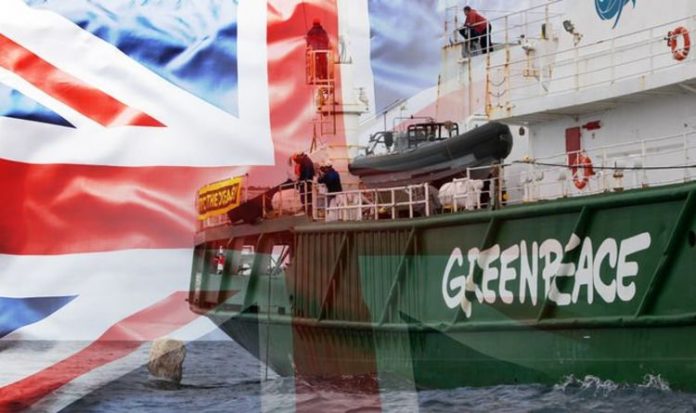And the environmental pressure group has challenged the Government to use Brexit to take the steps necessary to protect the waters around the UK once the nation is no longer restricted by the European Union’s Common Fisheries Policy (CFP). Activists on Greenpeace’s ship, Esperanza, began what campaigners refer to as the “closure” of almost 50 square miles of the Dogger Bank protected area in the North Sea to a method of fishing known as bottom trawling, whereby a huge net known as a trawl is dragged across the sea bed.
The operation follows a Greenpeace investigation suggesting industrial bottom trawlers are breaking the law while fishing in the Dogger Bank, with 11 out of 19 ships spotted operating there in June found to be AIS dark, making them effectively invisible to satellite navigation systems in breach of UK and international maritime law.
Chris Thorne, a Greenpeace UK oceans campaigner, said from on board the Esperanza: “Our Government has utterly failed to protect the Dogger Bank, and all our marine protected areas, from destructive industrial fishing.
“How can you continue to allow bottom trawlers to plough the seabed in a protected area designed specifically to protect the seabed?
“It beggars belief that this Government continues to call itself a ‘global ocean champion’ when it leaves its own seas at the mercy of destructive industrial fishing.
“Allowing bottom trawling in a protected area established to protect the seabed is equivalent to allowing bulldozers to plough through a protected forest.
“This must stop. Our Government won’t act, and we can’t sit idly by while they allow supposedly protected parts of our oceans to be destroyed.
JUST IN: POLL – should UK hand Elgin Marbles back to Greece?
“This ban will be easier to enact after Britain leaves the European Union’s Common Fisheries Policy.”
Greenpeace accuses bottom trawlers of damaging the Dogger Bank’s seabed with their operations.
The sand eels, crabs, flatfish and other species which live there are a vital source of food for porpoises and sea birds such as puffins.
Dogger Bank – a name familiar to anyone who ever listens to the shipping forecast on Radio 4 – was designated a Special Area of Conservation in 2017 – yet because there are currently no permanent restrictions on fishing activity in the protected area, Greenpeace says it is protected in name only.
The WWF, Client Earth and other NGOs last year lodged an official legal complaint against the UK, Dutch and German governments over their failure to properly protect the Dogger Bank from bottom trawling
Activists plan to keep placing boulders in the new bottom trawler exclusion zone until it is fully protected from all bottom trawling.
Prior to the operation, Greenpeace commissioned an independent scientific agency, BioLaGu, to conduct a Natura 2000 Environmental Impact Assessment on the potential impact of the activity, which concluded it would not have a significant impact on the protected feature of the Dogger Bank.
Greenpeace activists have also told all relevant marine authorities to ensure navigational safety for boats in the area.
A Defra spokesperson said: “We are putting sustainable fishing and protection of our seas at the heart of our future fishing strategy. We have already set up a ‘Blue Belt’ of protected waters nearly twice the size of England and the Fisheries Bill proposes new powers to better manage and control our Marine Protected Areas and English waters.
“The Common Fisheries Policy currently restricts our ability to implement tougher protections, but leaving the EU and taking back control of our waters as an independent coastal state means we can introduce stronger measures.”
Barrie Deas, chief executive of the National Federation of Fishermen’s Organisations (NFFO), told Express.co.uk: “First and foremost we fear for the crews of our vessels should their gear become entangled in what Greenpeace are describing as ‘massive granite boulders’.
“Secondly, AIS is not a fisheries enforcement tool – that is provided by the VMS (vessel monitoring system) – a satellite system that is mandatory for fishing vessels over 12 metres. So vessel monitoring for enforcement purposes is not an issue.
“Thirdly, bottom trawling is not illegal on the Dogger Bank.
“We do not condone vessels switching off their AIS, even if it is to keep positions secret from competitors.”







